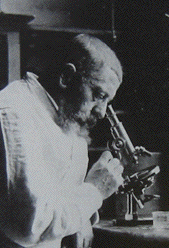 It seems that evaluating different SSL/TLS configurations has become a hobby of mine. After publishing Server Side TLS back in October, my participation in discussions around ciphers preferences, key sizes, elliptic curves security etc...has significantly increased (ironically so, since the initial, naive, goal of "Server Side TLS" was to reduce the amount of discussion on this very topic).
It seems that evaluating different SSL/TLS configurations has become a hobby of mine. After publishing Server Side TLS back in October, my participation in discussions around ciphers preferences, key sizes, elliptic curves security etc...has significantly increased (ironically so, since the initial, naive, goal of "Server Side TLS" was to reduce the amount of discussion on this very topic).
More guides are being written on configuring SSL/TLS server side. One that is quickly gaining traction is Better Crypto, which we discussed quite a bit on the dev-tech-crypto mailing list.
People are often passionate about these discussions (and I am no exception). But one item that keeps coming back, is the will to kill deprecated ciphers as fast as possible, even if that means breaking connectivity for some users. I am absolutely against that, and still believe that it is best to keep backward compatibility to all users, even at the cost of maintaining RC4 or 3DES or 1024 DHE keys in our TLS servers.
update: this blog post was posted almost two years ago, and thankfully we've managed to almost kill RC4 and 1024 DHE keys in the meantime. I still believe that backward compatibility is critical, but I certainly do not want to have to enable RC4 of weak keys ever again :)
One question that came up recently, on dev-tech-crypto, is "can we remove RC4 from Firefox entirely ?". One would think that, since Firefox supports all of these other ciphers (AES, AES-GCM, 3DES, Camellia, ...), surely we can remove RC4 without impacting users. But without numbers, it is not an easy decision to make.
Challenge accepted: I took my cipherscan arsenal for a spin, and decided to scan the Internet.
Scanning methodology
The scanning scripts are on github at https://github.com/jvehent/cipherscan/tree/master/top1m. The results dataset is here: http://4u.1nw.eu/cipherscan_top_1m_alexa_results.tar.xz. Uncompressed, the dataset is around 1.2GB, but XZ does an impressive job at compressing that to a 17MB archive.
I use Alexa's list of top 1,000,000 websites as a source. The script called "testtop1m.sh" scans targets in parallel, with some throttling to limit the numbers of simultaneous scans around 100, and writes the results into the "results" directory. Each target's results are stored in a json file named after the target. Another script named "parse_results.py", walks through the results directory and computes the stats. It's quite basic, really.
It took a little more than 36 hours to run the entire scan. A total of 451,470 websites have been found to have TLS enabled. Out of 1,000,000, that's a 45% ratio.
While not a comprehensive view of the Internet, it carries enough data to estimate the state of SSL/TLS in the real world.
SSL/TLS survey of 451,470 websites from Alexa's top 1 million websites
Ciphers
Cipherscan retrieves all supported ciphers on a target server. The listing below shows which ciphers are typically supported, and which ciphers are only supported by some websites. This last item is the most interesting, as it appears that 1.23% of websites only accept 3DES, and 1.56% of websites only accept RC4. This is important data for developers who are considering dropping support for 3DES and RC4.
Noteworthy: there are two people, out there, who, for whatever reason, decided to only enable Camellia on their sites. To you, Sirs, I raise my glass.
The battery of unusual ciphers, prefixed with a 'z' to be listed at the bottom, is quite impressive. The fact that 28% of websites support DES-CBC-SHA clearly outlines the need for better TLS documentation and education.
Supported Ciphers Count Percent -------------------------+---------+------- 3DES 422845 93.6596 3DES Only 5554 1.2302 AES 411990 91.2552 AES Only 404 0.0895 CAMELLIA 170600 37.7877 CAMELLIA Only 2 0.0004 RC4 403683 89.4152 RC4 Only 7042 1.5598 z:ADH-DES-CBC-SHA 918 0.2033 z:ADH-SEED-SHA 633 0.1402 z:AECDH-NULL-SHA 3 0.0007 z:DES-CBC-MD5 55824 12.3649 z:DES-CBC-SHA 125630 27.8269 z:DHE-DSS-SEED-SHA 1 0.0002 z:DHE-RSA-SEED-SHA 77930 17.2614 z:ECDHE-RSA-NULL-SHA 3 0.0007 z:EDH-DSS-DES-CBC-SHA 11 0.0024 z:EDH-RSA-DES-CBC-SHA 118684 26.2883 z:EXP-ADH-DES-CBC-SHA 611 0.1353 z:EXP-DES-CBC-SHA 98680 21.8575 z:EXP-EDH-DSS-DES-CBC-SHA 11 0.0024 z:EXP-EDH-RSA-DES-CBC-SHA 87490 19.3789 z:EXP-RC2-CBC-MD5 105780 23.4301 z:IDEA-CBC-MD5 7300 1.6169 z:IDEA-CBC-SHA 53981 11.9567 z:NULL-MD5 379 0.0839 z:NULL-SHA 377 0.0835 z:NULL-SHA256 9 0.002 z:RC2-CBC-MD5 63510 14.0674 z:SEED-SHA 93993 20.8193
Key negotiation
A pleasant surprise, is the percentage of deployment of ECDHE. 21% is not a victory, but an encouraging number for an algorithm that will hopefully replace RSA soon (at least for key negotiation).
DHE, supported since SSLv3, is closed to 60% deployment. We need to bump that number up to 100%, and soon !
Supported Handshakes Count Percent -------------------------+---------+------- DHE 267507 59.2524 ECDHE 97570 21.6116
PFS
Perfect Forward Secrecy is all the rage, so evaluating its deployment is most interesting. I am actually triple checking my results to make sure that the percentage below, 75% of websites supporting PFS, is accurate, because it seems so large to me. Even more surprising, is the fact that 61% of tested websites, either prefer, or let the client prefer, a PFS key exchange (DHE or ECDHE) to other ciphers.
As expected, the immense majority, 98%, of DHE keys are 1024 bits. Several reasons to this:
- In Apache 2.4.6 and before, the DH parameter is always set to 1024 bits and is not user configurable. Future versions of Apache will automatically select a better value for the DH parameter.
- Java 6, and probably other libraries as well, do not support a DHE key size larger than 1024 bits.
So, while everyone agrees that requiring a RSA modulus of 2048 bits, but using 1024 bits DHE keys, effectively reduces TLS security, there is no solution to this problem right now, other than breaking backward compatibility with old clients.
On ECDHE's side, handshakes almost always use the P-256 curve. Again, this makes sense, since Internet Explorer, Chrome and Firefox only support P256 at the moment. But according to recent research published by DJB & Lange, this might not be the safest choice.
The curve stats below are to take with a grain of salt: Cipherscan uses OpenSSL under the hood, and I am not certain of how OpenSSL elects the curve during the Handshake. This is an area of cipherscan that needs improvement, so don't run away with these numbers just yet.
Supported PFS Count Percent PFS Percent -------------------------+---------+--------+----------- Support PFS 342725 75.9131 Prefer PFS 279430 61.8934 DH,1024bits 262561 58.1569 98.1511 DH,1539bits 1 0.0002 0.0004 DH,2048bits 3899 0.8636 1.4575 DH,3072bits 2 0.0004 0.0007 DH,3248bits 2 0.0004 0.0007 DH,4096bits 144 0.0319 0.0538 DH,512bits 76 0.0168 0.0284 DH,768bits 825 0.1827 0.3084 ECDH,P-256,256bits 96738 21.4273 99.1473 ECDH,B-163,163bits 37 0.0082 0.0379 ECDH,B-233,233bits 295 0.0653 0.3023 ECDH,B-283,282bits 1 0.0002 0.001 ECDH,B-571,570bits 329 0.0729 0.3372 ECDH,P-224,224bits 4 0.0009 0.0041 ECDH,P-384,384bits 108 0.0239 0.1107 ECDH,P-521,521bits 118 0.0261 0.1209
Protocols
A few surprises in the Protocol scanning: there is still 18.7% of websites that support SSLv2! Seriously, guys, we've been repeating it for years: SSLv2 is severely broken, don't use it!
I particularly appreciate the 38 websites that only accept SSLv2. Nice job.
Also of interest, is the 2.6% of websites that support TLSv1.2, but not TLSv1.1. This would make sense, if the number of TLSv1.2 websites was actually larger than 2.6%, but it isn't (0.001%). So I can only imagine that, for some reason, websites use TLSv1 and TLSv1.2, but not 1.1.
Update: ''harshreality'', on HN, dug up a changelog in OpenSSL that could explain this behavior:
Changes between 1.0.1a and 1.0.1b 26 Apr 2012
- OpenSSL 1.0.0 sets SSL_OP_ALL to 0x80000FFFL and OpenSSL 1.0.1 and 1.0.1a set SSL_OP_NO_TLSv1_1 to 0x00000400L which would unfortunately mean any application compiled against OpenSSL 1.0.0 headers setting SSL_OP_ALL would also set SSL_OP_NO_TLSv1_1, unintentionally disablng TLS 1.1 also. Fix this by changing the value of SSL_OP_NO_TLSv1_1 to 0x10000000L Any application which was previously compiled against OpenSSL 1.0.1 or 1.0.1a headers and which cares about SSL_OP_NO_TLSv1_1 will need to be recompiled as a result.
Unsurprisingly, however, the immense majority supports SSLv3 and TLSv1. Respectively 99.6% and 98.7%. The small percentage of websites that support TLSv1.1 and 1.2 is worrisome, but not surprising.
Systems administrators are hardly to blame, considering the poor support of recent TLS versions in commercial products. Vendors could definitely use a push, so before you renew your next contract, make sure to add TLSv1.2 to your wishlist.
Supported Protocols Count Percent -------------------------+---------+------- SSL2 85447 18.9264 SSL2 Only 38 0.0084 SSL3 449864 99.6443 SSL3 Only 4443 0.9841 TLS1 446575 98.9158 TLS1 Only 736 0.163 TLS1.1 145266 32.1762 TLS1.1 Only 1 0.0002 TLS1.2 149921 33.2073 TLS1.2 Only 5 0.0011 TLS1.2 but not 1.1 11888 2.6332
What isn't tested
This is not a comprehensive test. RSA key sizes are not evaluated. Nor are TLS extensions, OCSP Stapling support, and a bunch of features that could be interesting to loop at. Maybe next time.
Educate, and be backward compatible
If this little experiment showed something, it is that old ciphers and protocols are far from dead. Sure, you can decide to kill RC4 and 3DES in your client today, but be aware that a small percentage of the internet will be unreachable to you, and your users.
 What can we do about it? Education is key: TLS is a complex subject, and most administrators and website owners don't have the time and knowledge to dig through dozens of mailing lists and blog posts to find the best configuration choices.
What can we do about it? Education is key: TLS is a complex subject, and most administrators and website owners don't have the time and knowledge to dig through dozens of mailing lists and blog posts to find the best configuration choices.
It is the primary motivation for documents such as Server Side TLS and Better Crypto. Some of us are working on improving these documents. But we need an army to broadcast the message, teach administrators in conferences, mailing lists and user groups, and push websites owners to apply more secure configuration to their websites.
We could use some help: go out there and teach TLS !



